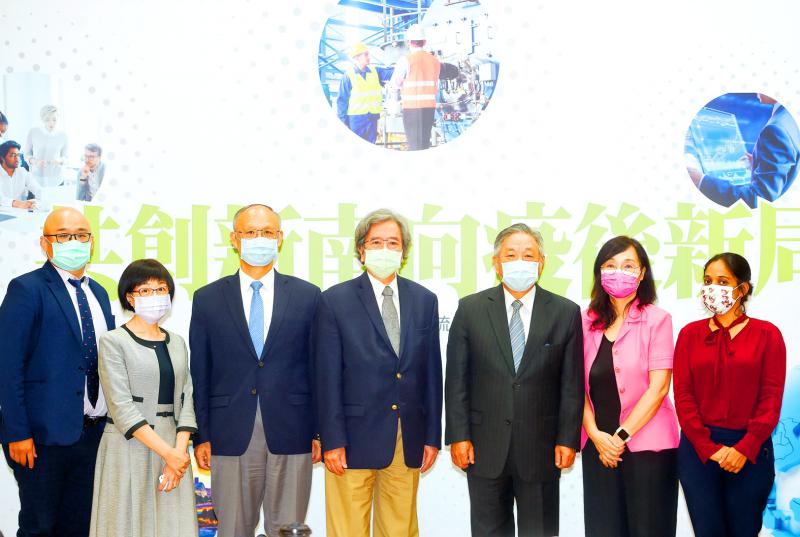A forum in Taipei on Friday discussed the future of the nation’s New Southbound Policy in a post-COVID-19 world.
The policy, introduced in 2016, aims to boost interactions between Taiwan, ASEAN and South Asian nations in human resources, industry, investment, education, culture, tourism and agriculture.
Taiwan should find ways to enhance its strategic importance in the Indo-Pacific region, in addition to attracting economic investment and encouraging talent exchanges, Deputy Minister of Foreign Affairs Tien Chung-kwang (田中光) told the forum, which was initiated by the Taiwan-Asia Exchange Foundation and hosted by the Chinese-language Liberty Times (sister newspaper of the Taipei Times).

Photo: Fang Pin-chao, Taipei Times
The New Southbound Policy should be more compatible with policies enacted by other countries in the region, especially as the international community turns its attention toward the Indo-Pacific region amid growing concern about stability in the Taiwan Strait area, he said.
ASEAN policies are focused on strengthening its bloc, while Taiwan’s regional policies are geared more toward trade, education and fostering talent, Tien said, adding that it is perhaps time for Taiwan to discuss how to broaden its scope and view in the region.
Citing how the Quadrilateral Security Dialogue in March included climate change, vaccines and emerging technologies, he said that regional policies should not become overly focused on military issues.
“It is of utmost importance that Taiwan’s New Southbound Policy find ways to connect with this trend,” Tien said.
One option is to expand Taiwan’s Global Cooperation and Training Framework collaboration with the US and Japan, he said.
Taiwan has worked with the US under the framework since 2015, holding more than 30 international seminars in fields such as public health, law enforcement, disaster relief, energy cooperation, women’s empowerment, the digital economy, cybersecurity and media literacy, attracting 2,500 attendees from more than 90 countries, he said.
Such fields correspond with the government’s New Southbound Policy, he added.
Minister Without Portfolio John Deng (鄧振中) said that Taiwan could attract students from the 18 countries included in the policy, to mitigate the impact of the nation’s declining birthrate.
The Ministry of Health and Welfare’s relaxation of regulations for the medical industry could also lead to growth, especially with innovations in telemedicine, he said.
Taiwan should also step up its investments in Southeast Asia to benefit from the reorganization of the global supply chain, he said.
Non-governmental organizations such as the Taiwan-Asia Exchange Foundation can play a role in the policy’s influence, as foundations have a wider reach than the government, Deng said.
Foundation chairman Michael Hsiao (蕭新煌), who is also a presidential adviser, said that government units and the private sector, led by the foundation, should meet at the end of this year to discuss a new direction for the policy.

The Grand Hotel Taipei on Saturday confirmed that its information system had been illegally accessed and expressed its deepest apologies for the concern it has caused its customers, adding that the issue is being investigated by the Ministry of Justice Investigation Bureau. The hotel said that on Tuesday last week, it had discovered an external illegal intrusion into its information system. An initial digital forensic investigation confirmed that parts of the system had been accessed, it said, adding that the possibility that some customer data were stolen and leaked could not be ruled out. The actual scope and content of the affected data

‘LIKE-MINDED PARTNER’: Tako van Popta said it would be inappropriate to delay signing the deal with Taiwan because of China, adding he would promote the issue Canadian senators have stressed Taiwan’s importance for international trade and expressed enthusiasm for ensuring the Taiwan-Canada trade cooperation framework agreement is implemented this year. Representative to Canada Harry Tseng (曾厚仁) in an interview with the Central News Agency (CNA) said he was increasingly uneasy about Ottawa’s delays in signing the agreement, especially as Ottawa has warmed toward Beijing. There are “no negotiations left. Not only [is it] initialed, we have three versions of the text ready: English, French and Mandarin,” Tseng said. “That tells you how close we are to the final signature.” Tseng said that he hoped Canadian Prime Minister Mark Carney

President William Lai (賴清德) yesterday bestowed one of Taiwan’s highest honors on Saint Vincent and the Grenadines (SVG) Ambassador Andrea Clare Bowman in recognition of her contributions to bilateral ties. “By conferring the Order of Brilliant Star with Grand Cordon on Ambassador Bowman today, I want to sincerely thank her, on behalf of the Taiwanese people, for her outstanding contribution to deepening diplomatic ties between Taiwan and SVG,” Lai said at a ceremony held at the Presidential Office in Taipei. He noted that Bowman became SVG’s first ambassador to Taiwan in 2019 and

A man walks past elementary school artworks at the Taipei Lantern Festival in Ximen District yesterday, the first day of the event. The festival is to run from 5pm to 10pm through March 15.